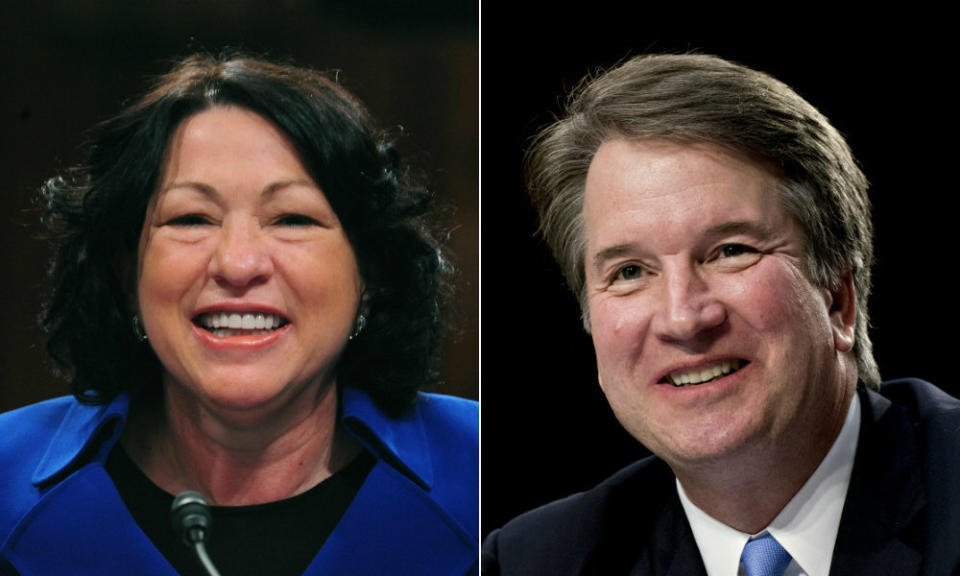Yale's Endorsement Of Brett Kavanaugh Reveals The Legal Establishment's True Colors

Generations ago, there was a Yale Law School professor who would start every class with: “Good morning, gentlemen.” Despite the growing number of women in the room, he reasoned that all lawyers should behave as gentlemen — regardless of their gender or background. The greeting is part of my alma mater’s unofficial history, a story that is still retold for its enduring subtext: the preference the legal profession has for those who have always been members of its gentlemen’s club.
This week, several of my former professors and fellow alumni, along with dozens of other well-known lawyers and academics, came out to support Supreme Court nominee Brett Kavanaugh — the quintessential gentleman. But interpreting their statements requires understanding the archaic context in which they’re made.
A telling example of how legal elites overvalue men of privilege and pedigree is the statement Yale Law School itself released lauding the nomination of Kavanaugh. The gushing announcement included quotes from five different professors praising the thoroughbred nominee as “one of the most learned judges in America,” “a true intellectual” who writes “smart, thoughtful, and clear” opinions.
Contrast that with the statement Yale Law School issued in 2009, in which just two professors commended the nomination of now Supreme Court Justice Sonia Sotomayor. Those faculty focused heavily on personality traits, admiring “a warm and wonderful human being” and “thoughtful and fair-minded jurist” “who combines heart and head.”
Kavanaugh’s privilege and status — not just his ideology — might influence his ability to appreciate the practical consequences of his opinions and votes.
The differences between the two statements might seem subtle. But as any lawyer will tell you, subtlety matters. One reads like a glowing endorsement of a gentleman’s intellect and prestige; the other like a cautious job reference hedging on a brown woman’s qualifications by focusing on her personality traits. Add to that a University of Chicago professor’s recent tweet calling Sotomayor a “second-class intellect,” along with Harvard Law professor Laurence Tribe’s private memo to the Obama White House before her nomination in which he acknowledged her “personal history and demographic appeal,” but noted, “she’s not nearly as smart as she thinks she is.”
And yet, Sotomayor made history as a Puerto Rican woman from the Bronx who rose to become the first Latina on our nation’s highest court. Meanwhile, Kavanaugh — as smart as he may be — is a particularly run-of-the-mill Supreme Court nominee with an elite upbringing and fancy high school classmates that include potential future colleague Justice Neil Gorsuch.
As Justice Clarence Thomas once pointed out, “a law degree from Yale meant one thing for white graduates and another for blacks, no matter how much anyone denied it.” Yet, while he blamed affirmative action, research suggests confirmation bias is the likely root culprit. Study after study shows that lawyers consistently deny minorities the presumption of competence simply because they don’t look the part while overestimating the abilities of the gentlemen that do. Too often the only way for minorities to have a successful legal career is to do what law professor Kenji Yoshino calls “covering,” playing down outsider identities in order to fit in.
When I started at Yale Law School in 2011, it had never had a Latino tenure-track faculty member in its nearly 200-year history. As a member of the Latino Law Students Association, I saw for myself how the administration either ignored or rejected dozens of qualified candidates our group researched and recommended, as it had been doing for years. Either there wasn’t a single Latino legal academic who met Yale’s rigorous standards, or, more likely, it was holding Latinos to an entirely different standard.
The senators vetting nominees should be wary of taking endorsements like the one provided by Yale Law School at face value — ones that elevate prestige and abstract intellectualism over real-world considerations. In fact, other lawyers have had very different things to say about Kavanaugh, describing him as “insulated,” and “immovable and very stubborn and frustrating to deal with on some issues.”
Most importantly, the Senate should seriously question whether Kavanaugh’s privilege and status — not just his ideology — might influence his ability to appreciate the practical consequences of his opinions and votes. It should ask why the “originalist” approach to constitutional interpretation favored by Kavanaugh so often produces results that seem to favor the powerful over the powerless on issues ranging from immigration and affirmative action to labor rights and campaign finance.
Before voting to confirm Kavanaugh, senators should carefully assess the testimony of witnesses like Yale Law School professor Akhil Amar, who was invited by Republicans to appear before the Judiciary Committee on Friday. Are they using balanced criteria of the qualities a judge should embody, or are they simply rubber-stamping one of their own?
Sotomayor and Kavanaugh are both objectively sharp, learned and accomplished jurists. But her background and credentials were never permitted to speak for themselves. Neither should his.
Andrea Nill Sanchez is a director at The Raben Group, where she helps clients navigate the media, policy and advocacy spaces. She is a former reporter for ThinkProgress and trial attorney.
This article originally appeared on HuffPost.


